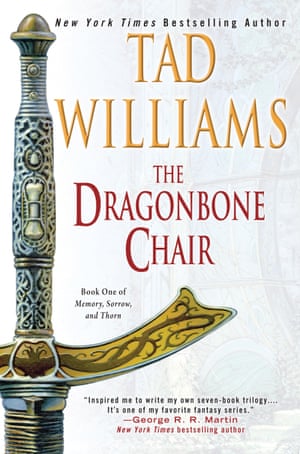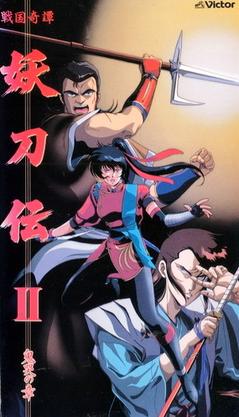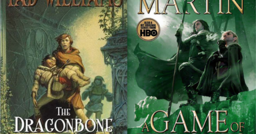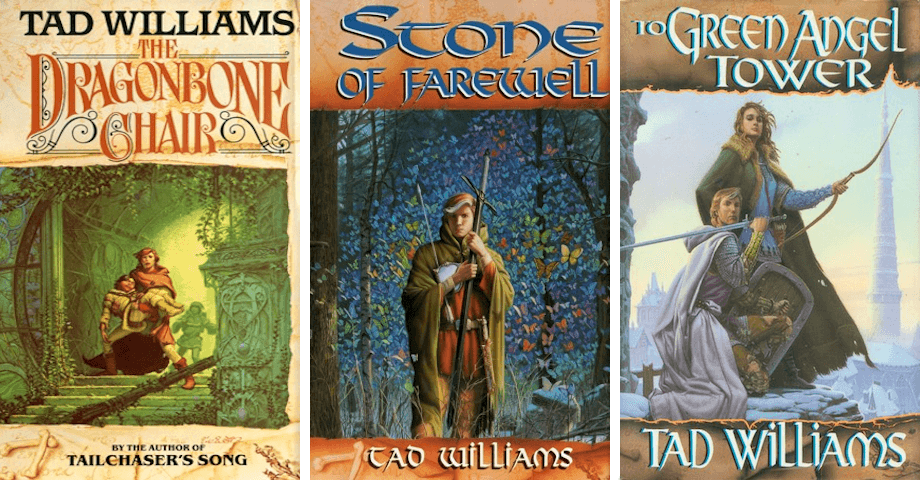Interview
Tropes, trolls and Trump: the fantasy writer who inspired George RR Martin
David Barnett
Without Tad Williams there would be no Game of Thrones. The American novelist on reinventing fantasy – and why no one ever thinks they’re the bad guys
@davidmbarnett
Tue 17 Jan 2017 11.30 GMT Last modified on Thu 22 Feb 2018 12.46 GMT
Comments
156

‘Even Tolkien’s orcs must have felt some justification for what they were doing’: author Tad Williams. Photograph: Andy Freeberg
When the American fantasy writer Tad Williams first met Game of Thrones author
George RR Martin, Martin growled at him: “Get the hell out of here.”
This was not yet another egoistic literary beef; Martin merely wanted his fellow author to get home and finish the next instalment of his Memory, Sorrow and Thorn series, which Martin had been patiently waiting to read. Perhaps this was a bit hypocritical coming from
the famously slow-writing author of the series A Song of Ice and Fire, who is loved and moaned at by fans furiously awaiting his next book. But while Williams, who turns 60 in March, might not be quite the household name Martin is, he deserves wider cultural recognition: without Tad Williams, there would be no Game of Thrones.
I read The Dragonbone Chair and said, my God, they can do something with this form, and it’s Tad doing it
George RR Martin
“The Dragonbone Chair and the rest of his famous ‘I
four-book trilogy [were some] of the things that inspired me to write my own seven-book trilogy,”
said Martin in 2011. “Fantasy got a bad rep for being formulaic and ritual. And I read The Dragonbone Chair and said, ‘My God, they can do something with this form, and it’s Tad doing it.’ It’s one of my favourite fantasy series.”
In the 1980s, the genre’s bad reputation was well-earned: three decades after the publication of The Lord of the Rings, fantasy still trod well-worn and thinly veiled medieval European paths. Fictional worlds were typically populated by elves and dwarves, orcs and goblins, questing heroes and two-dimensional female characters (if there were any at all). Like Martin, Williams was once disenchanted: having had his mind blown by The Lord of the Rings when he was 11 years old, he spent years devouring all the fantasy books he could find – and was left wanting. “I was looking for originality and what I was getting was warmed-over rehashes of Tolkien,” he says. “Eventually, it occurred to me: I can do better than this.”
“Better than this” would be his 1988 novel The Dragonbone Chair, the first book of his Memory, Sorrow and Thorn series, set in the richly detailed world of Osten Ard. It was followed in 1990 by The Stone of Farewell and then in 1993 with To Green Angel Tower, which was split into two volumes, making it a four-book trilogy. For anyone who came to the series during the rise of post-Tolkien fantasy, all the elements were there: Williams’s elf-alikes the Sithi or Norns, and his troll-ish Quanucs. But looking back, the series marked the start of a more politically aware, intricately designed brand of fantasy. The debt Westeros owes to Osten Ard is undoubtable.
 Facebook Twitter
Pinterest
Facebook Twitter
Pinterest
Before Westeros there was Osten Ard … Sean Bean in The Game of Thrones. Photograph: HBO/Everett/Rex Shutterstock
Advertisement
Williams was born Robert Paul Williams in Palo Alto, California, but the childhood name of Tad – a reference to a character in the long-running US comic strip Pogo – stuck. A reader but never an academic, Williams attended University of California, Berkeley, but admits he wasn’t “in the right frame of mind to study” and dropped out after one semester. He knew he wanted to be creative, which led to him playing in rock bands, working in the theatre and DJ-ing at a radio station, all the while holding down what he calls “crap jobs to keep a roof over my head” – everything from selling tacos and collecting loans to drawing military manuals.
“The word ‘potential’ was bandied about a lot when I was younger,” he says, laughing. “When you are young, that’s a positive thing to have said about you. But when you hit your 20s, it can maybe be a bit grim if people are talking about your potential but you’re not really doing anything.”
 Facebook Twitter
Pinterest
Facebook Twitter
Pinterest
Then Williams started writing, producing The Tailchaser’s Song, a fantasy novel about a cat in a world of sentient animals. It found a publisher when he was 28; even three decades on, the sense of achievement he felt at that first sale is palpable. “After eight years or so of putting creative things out in the world, this was finally some recompense, I was like, thank God! It was a bit of a shock, but also an immense relief.”
Williams didn’t just subvert the tropes of fantasy fiction, he asked readers to also question them, particularly the idea of a golden age, that “the past was brighter, more elegiac, more beautiful, that it’s a transitory state in a fallen world”. He pauses, almost as if to consider this possibility. “But what if the idea of the golden age is false? What if it had its own secrets?”
Williams continued to be prolific after Memory, Sorrow and Thorn – another four books in the Otherland sequence, four more in his noughties epic Shadowmarch. The Otherland books brought him international fame, particularly in Germany, where Williams is revered at Martin levels. Bookstores host window displays for him, he gets magazine covers and there was even a German radio adaptation of the Otherland books. He’s the literary David Hasselhoff, bigger in Germany than the US.
He guffaws at the comparison. “I hadn’t thought about it that way before. Maybe I am! I didn’t discover I was big there for a long time because of the way the contracts were laid out. It wasn’t until my wife took a really close look at the contracts that we realised I was selling a lot of books in Germany. I go out there quite a lot now.”
Advertisement
Williams still lives in California, with his British-born wife, Deborah, their two children and a menagerie of animals. He may immerse himself in world-building for made-up lands, but he also hyperaware of the real dramas unfolding around him, such as the incoming presidency of Donald Trump.
“Maybe it’s because I’m a lefty liberal, but I think we’re in a heap of trouble,” he says. “I’ve got gay and Hispanic friends who are absolutely terrified. It’s going to be a tough road.” He pauses. “But we got through the Reagan years, we got through the Bush years. We just need to hunker down to get through the Trump years.”
No one thinks they are the bad guys – not unless they’re sociopaths, anyway
Tad Williams
The change of regime in Washington coincides with a fresh look at the world of Osten Ard. In April, a new trilogy will begin:
The Last King of Osten Ard, beginning with The Witchwood Crown. It represents a new age for the land, long after the events of The Dragonbone Chair. To bridge the gap, this month Williams published The Heart of What Was Lost, a short novel that connects the two series. In it he focuses on the Norns, the elf-like race, and what happened to them after the events of Memory, Sorrow and Thorn. It is, in true Williams style, morally ambiguous. “In fantasy, there was the idea that other races, orcs or goblins or whatever, were basically just evil. But even Tolkien’s orcs must have felt some justification for what they were doing.”
Sign up for Bookmarks: discover new books in our weekly email
Read more
Through revisiting Osten Ard, Tad Williams may, consciously or not, be trying to make sense of the changed world we find ourselves living in at the start of 2017. It’s unclear whether he’s talking about the Trump administration or his otherworldly Norns when he says, “No one thinks they are the bad guys – not unless they’re sociopaths, anyway.”
Because that, of course, is what the best fantasy has always done: reflected our own image back at us through the frosted glass of a magic mirror.
•
The Heart of What Was Lost by Tad Williams is out now from Hodder & Stoughton. To order a copy for £14.44, go to bookshop.theguardian.com or call 0330 333 6846. Free UK p&p over £10, online orders only. Phone orders min p&p of £1.99.{/quote]


en.wikipedia.org






